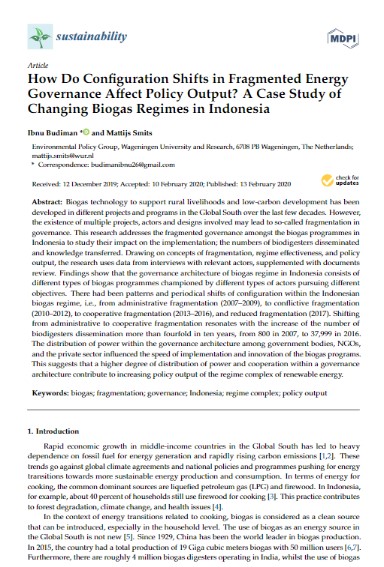
Keyword(s)
Author(s)
(a) Ibnu Budiman; (b) Mattijs Smits
Publisher
Published Date
Access
DOI
Environmental Policy Group, Wageningen University, 6700 AK, Wageningen, The Netherlands
Biogas technology to support rural livelihoods and low-carbon development has been developed in different projects and programs in the Global South over the last few decades. However, the existence of multiple projects, actors and designs involved may lead to so-called fragmentation in governance. This research addresses the fragmented governance amongst the biogas programmes in Indonesia to study their impact on the implementation; the numbers of biodigesters disseminated and knowledge transferred. Drawing on concepts of fragmentation, regime effectiveness, and policy output, the research uses data from interviews with relevant actors, supplemented with documents review. Findings show that the governance architecture of biogas regime in Indonesia consists of different types of biogas programmes championed by different types of actors pursuing different objectives. There had been patterns and periodical shifts of configuration within the Indonesian biogas regime, i.e., from administrative fragmentation (2007–2009), to conflictive fragmentation (2010–2012), to cooperative fragmentation (2013–2016), and reduced fragmentation (2017). Shifting from administrative to cooperative fragmentation resonates with the increase of the number of biodigesters dissemination more than fourfold in ten years, from 800 in 2007, to 37,999 in 2016. The distribution of power within the governance architecture among government bodies, NGOs, and the private sector influenced the speed of implementation and innovation of the biogas programs. This suggests that a higher degree of distribution of power and cooperation within a governance architecture contribute to increasing policy output of the regime complex of renewable energy
Cite
Budiman, I.; Smits, M. How Do Configuration Shifts in Fragmented Energy Governance Affect Policy Output? A Case Study of Changing Biogas Regimes in Indonesia. Sustainability 2020, 12, 1358. https://doi.org/10.3390/su12041358